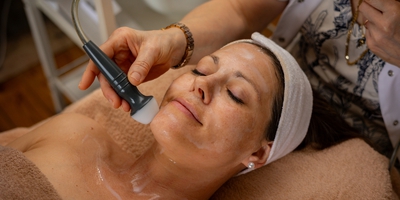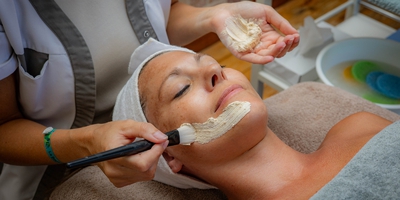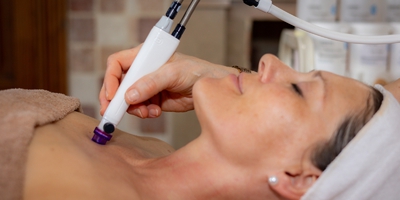A lack of happiness hormones – because you are too stressed, for instance – can affect your sleep quality, cause you to feel anxious more easily or to be in a bad mood. In the long term, this may even lead to burnout or depression. So, do try to schedule moments of relaxation every day!
First, let’s take a closer look at these wonderful happiness hormones. What exactly are they? They are neurotransmitters that are produced in your brain, in the pituitary gland, and they enable your brain cells to communicate with each other. They have a positive effect on your mood, they make you feel happy, as it were. These neurotransmitters are carried all around your body in the bloodstream and via the nerve pathways and have a stress- and pain-relieving effect. The happiness hormones work together to increase your general wellbeing. The different happiness hormones are serotonin, endorphins, dopamine and oxytocin. We tell you a bit more about each of them below.
Serotonin
Serotonin is actually a natural painkiller, even a kind of antidepressant. It’s often referred to as the feel-good hormone! This neurotransmitter affects how your body responds to pain, reduces feelings of anxiety, improves sleep and helps restore your emotional balance. It also improves your memory, has a calming effect and gives you an energy boost.
What can you do to influence serotonin production? Serotonin is released when you are exposed to natural daylight and during exercise, among other things. So, why not go for a walk in the sunshine during your lunch break? Laughing, too, increases the production of serotonin and we all know that having a good giggle is a great stress reliever.
Serotonin is also released when you have a massage. Another great reason to treat yourself to one of these at our Thermae wellness centres!
Did you know, by the way, that an estimated 90% of serotonin is produced in your gut? So, a healthy breakfast not only sets you up for the day, it also helps promote the production of serotonin. Serotonin-boosting foods to add to your breakfast include a banana, sunflower seeds and milk.
Endorphins
Endorphins are another class of energy-boosting hormones that are released when you are in pain. Produced in your brain, they are transported via your bone marrow all over your body. They numb feelings of exhaustion and so are, in effect, a form of opiates. Endorphins have similar properties to morphine; they are a natural feel-good drug. In addition, they boost your immune system and reduce feelings of anxiety.
What can you do to increase the production of endorphins?
Exercise! When you exercise, you tax your body, which sends pain signals to your brain. The brain responds by releasing endorphins, among other things. But you have to exercise for at least twelve minutes before endorphins are produced. So, how do you know whether or not your body has started to produce them? At the start of your run, for instance, things often feel a bit laborious. Your calf muscles are a bit achy or your feet feel a bit heavy, but when you keep going, you notice that, after a while, this discomfort seems to ease by itself. That’s when the endorphins kick in!
Just like serotonin, the production of endorphins is also influenced by natural daylight. When your skin is exposed to sunlight, the cholesterol in your skin layers absorb this sunlight and transport it to your liver and kidneys, where it’s transformed into vitamin D. This vitamin has a positive effect on your immune system, among other things.
And here’s another fun fact: eating chocolate also releases endorphins, as well as eating spicy food. So, add the occasional chilli pepper to your sauce! Unfortunately, fatty and/or sugary foods also have a positive effect on your endorphin levels, which is why they can be so ‘addictive’.
Meditating or having a good laugh or cry also promotes the release of endorphins.
Dopamine
Dopamine boosts motivation. When dopamine is released in your brain, it gives you a sense of reward, which drives you to repeat a particular activity or behaviour. Great for positive behaviours like exercise, for instance.
Oxytocin
Finally, there is oxytocin, the cuddle hormone. And yes, you guessed it, this hormone is released when we touch other people, but also when you cuddle your pet, for instance. Oxytocin is a neurotransmitter produced by the body, made up of nine amino acids.
Oxytocin is our natural ally; it helps lower cortisol. Cortisol is, in effect, the big villain when it comes to stress and is released when we find ourselves in dangerous or stressful situations to ensure that we can continue to function at those times. But high levels of cortisol for an extended period of time will make you feel too stressed and can even lead to burnout, because cortisol inhibits the production of the happiness hormones. Luckily, oxytocin keeps the production of cortisol in check. It promotes positive feelings, helps you feel more relaxed and confident. It also increases feelings of empathy. It’s the hormone that ensures a mother bonds with her newborn baby immediately after giving birth. But that’s not all oxytocin does. It also increases fat burning and causes you to feel satiated.
What can you do to stimulate oxytocin production?
Oxytocin is released in response to touch, so cuddle your partner, your kids, your best friends or your pets. Or book a massage, have a bath, listen to great music or meditate. Women are more sensitive to oxytocin than men because women have higher oestrogen levels than men. Oestrogen reinforces the effect of oxytocin.
Oxytocin doesn’t just reduce stress levels, it also has a positive effect on your blood pressure, your memory and your muscles.
A few tips
Convinced of the benefits of our happiness hormones? Here’s a quick reminder of things you can do to stimulate the release of happiness hormones!
- Eat chocolate!
- Have a good laugh or cry. It’s a great stress reliever.
- Book a massage because happiness hormones are released in response to touch.
- Exercise. Choose an activity or sport that makes you happy, whether that’s walking or running doesn’t really matter, as long as you move!
- A sauna session also boosts the production of happiness hormones. You can compare having a sauna to exercising. Your heartbeat increases by about 50% because of the heat and this also promotes the release of happiness hormones. What’s more, the experience of being offline for a day is calming in itself. When your body is at rest, it produces melatonin, also known as the sleep hormone. With positive effects noticeable both in the short and long term. You are able to fall asleep more quickly and enjoy a deeper sleep at that. And, a good night’s sleep is vital for your general wellbeing.
Of course, we already knew that a visit to the sauna and a divine massage or facial treatment does wonders for your mental state, but there is now also a fun survey to back this up. IWR (International Wellness Resorts, a Dutch sauna and wellness company) asked 6,000 customers about the effect of a day of sauna. The survey results revealed that the number of people giving their happiness level a rating of 10 (top rating) increased by more than 20% after a day of wellness. What about you, does a day of sauna and wellness make you happy?



